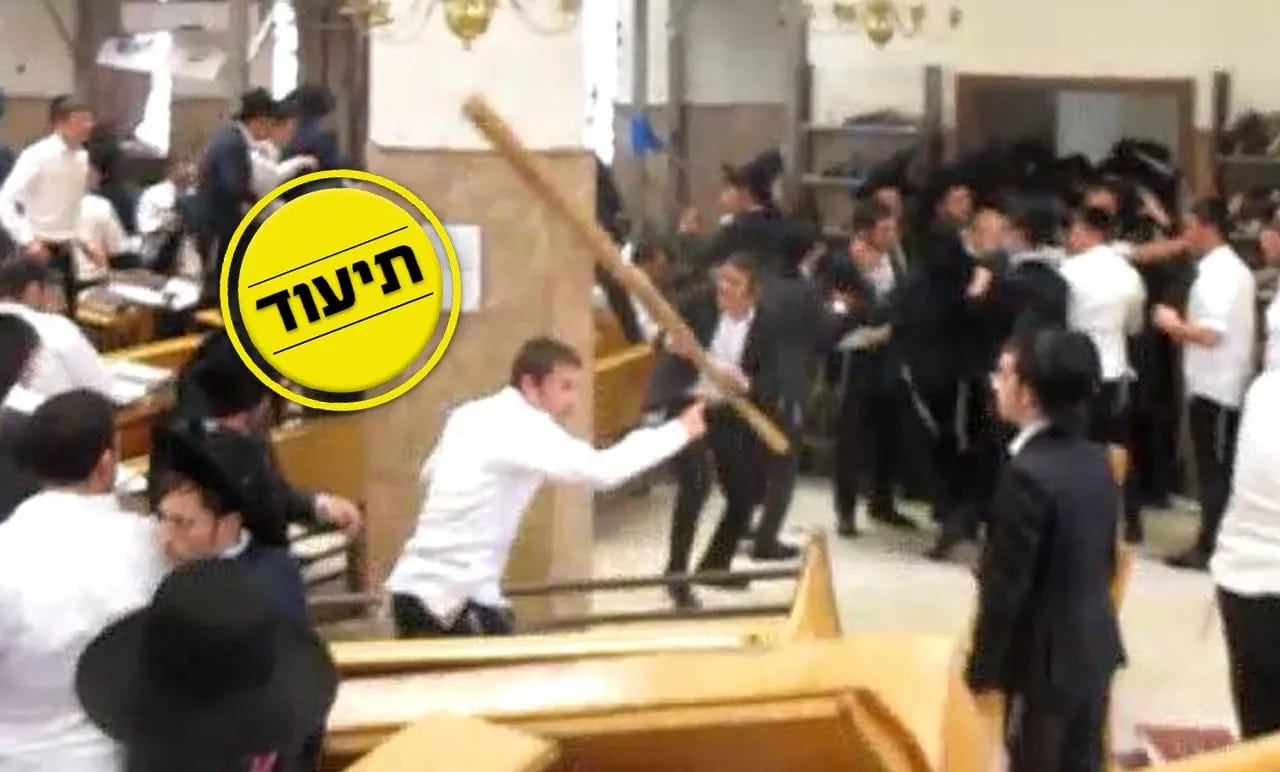Daas Torah's Violent Death
When a top yeshiva resorts to violence and secular guidance
One of the many differences between American yeshivish Jews and Israeli charedim is how the former is often so unaware of the realities of the latter. A powerful example is a highly significant story in one of the world’s top charedi yeshivos that is assiduously not reported by any of the yeshivish print press in the US. But I guess you can’t blame them, since it blows up popular notions of Daas Torah.
At the prestigious Ponovezh Yeshiva in Bnei Brak, there is a power struggle over leadership. Of course power struggles are nothing new, but this one is next-level. And it’s not just about the particular personas of the leaders, vis-a-vis the yeshiva; it also relates to policy approaches to Israel society. One group, known as “the haters,” is very strongly opposed to any participation in the IDF and so on. The other group, known as “the terrorists,” is even more strongly opposed to it, and engages in public protests.
How far do they take their disagreement with each other? There have been riots in the Beis HaMidrash, with yeshiva students punching rabbis, wielding weapons and even throwing stun-grenades. Apparently learning Torah and davenning does not accomplish their aims, and they need to resort to violent hishtadlus instead.
One can’t help but wonder. If they are already believe in such an approach, why can’t they be in the army, relieve the crushing burden on the reservists, and protect the Jewish People from those who want to kill us?
In the latest episode, reported in detail at The Times of Israel, the Rosh Yeshiva who leads one of the factions passed away, and there was a huge fight over where to bury him. Why not ask Daas Torah? Of course each side feels that they represent Daas Torah and the other doesn’t. But here’s where it gets really interesting.
One would expect them to ask a different Daas Torah - a prestigious rabbi from a different community. But that’s not what they did. Instead, they went for arbitration to a retired secular Israeli judge who went off the derech!
If the fact of yeshiva students sorting out disagreements with violence isn’t enough to show the bankrupcy of charedi ideology, the fact of their rabbis abandoning Daas Torah to go to a secular Israeli for judgment certainly does it.
Meanwhile, I’m not sure which side is the most hypocritical: the group that says that Torah replaces hishtadlus but still does maximum political hishtadlus to get money and army exemptions, or the group that proudly does not vote but engages in heavy-handed physical hishtadlus to accomplish their aims.




When Moshe Rabbenu leaves the Palace in Egypt and goes to see the slaves that he knew were his "brothers," the Torah reports that he encounters two Jews arguing and fighting. The correct translation of the verse (Shemot 2:13) -וַיֹּאמֶר לָרָשָׁע לָמָּה תַכֶּה רֵעֶךָ - He (Moshe) said to the evil one, "Why are you going to hit your friend?" Not, "Why are you hitting your friend?" but "why are you about to hit your friend?" Rashi responds to the obvious question: Why is the Jew who is going to hit his friend called an evil person - רשע? Rashi says: Just raising your hand to hit someone makes you an evil person - even before your actually hit the person." I guess the fellows at Ponevitch have forgotten what Rashi says. Too bad." Rashi is still one of the primary teachers of Judaism, including Jewish ethics. It is important that we listen and integrate into ourselves the life-lessons Rashi teaches us.
A few comments:
1)
>“One of the many differences between American yeshivish Jews and Israeli charedim is how the former is often so unaware of the realities of the latter.”
"Differences between" implies contrasting characteristics, but the sentence focuses only on one side (American yeshivish Jews' lack of awareness). Also, are Israeli charedim more aware of the realities of American yeshivish? Doubtful.
2)
>“A powerful example is a highly significant story in one of the world’s top charedi yeshivos that is assiduously not reported by any of the yeshivish print press in the US”.
The phrase, “assiduously not reported” is misleading. It’s not that stories are deliberately omitted, it’s simply that only positive (or at most, neutral) news about the community is ever published in the yeshivish press in the US. (Or if it's one of the many never-ending general "crises" affecting the community: shidduch crisis, parnasa crisis, loud music at chasunah crisis, etc etc.)
3)
>“At the prestigious Ponovezh Yeshiva in Bnei Brak, there is a power struggle over leadership.”
this is hardly a revelation. Having studied in yeshivish yeshivas, I can confirm that this power struggle, which began in 1997, is well-known. The most significant violence occurred between 1997 and 2009.
See the Hebrew Wikipedia page: הפילוג בישיבת פוניבז': https://he.wikipedia.org/wiki/%D7%94%D7%A4%D7%99%D7%9C%D7%95%D7%92_%D7%91%D7%99%D7%A9%D7%99%D7%91%D7%AA_%D7%A4%D7%95%D7%A0%D7%99%D7%91%D7%96%27
In general, this type of negative news is widely known in the yeshivish world through word of mouth, but it's never published. It's commonly referred to as "hock," "neias,", or more negatively as "loshon hora" (gossip), not that that stops it from being discussed by plenty of people in the community.
4)
>“Instead, they went for arbitration to a retired secular Israeli judge who went off the derech!”
This is indeed scandalous, but it’s not unique. Similar scenarios have occurred with Satmar, Bobov, Ger, and numerous other ultra-Orthodox groups, all of whom have recently brought internal disputes and asset battles to secular courts (as Michael Sedley mentioned as well, in his comment)